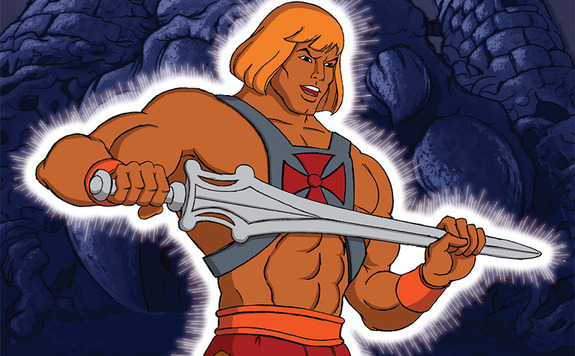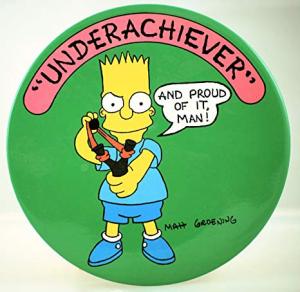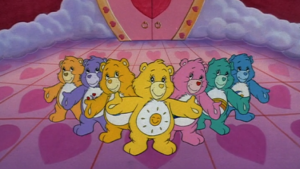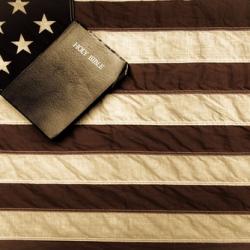
I’ve made no secret of the fact that I grew up in a Christian home, deeply entrenched in our Baptist church. Much as I might find to critique about it, I’m thankful for that experience. I was surrounded by family and friends who found joy and meaning in their faith, and I was part of a community that genuinely enjoyed serving together. In my darkest moments of doubt, it’s this warmth, joy and commitment to something bigger than myself that keeps me going.
But it wasn’t all potlucks and Jesus fish. There was some weirdness that, as an adult, I’ve begun to pick apart, sifting through to see what was part of my true faith and what was just part of the culture I grew up with. Some of these have been hard truths, like the knowledge that the church is full of just as many sinners as the rest of the world. Others have been non-essential doctrines that I’ve learned to agree to disagree with.
And others? Well, others are just funny.
While my upbringing wasn’t nearly as strict as many others’, my parents and my church had prohibitions on what I could watch and listen to, where I could go, and what I could do. It’s not that my parents were paranoid or overly strict; I was actually always thankful for two smart and cool parents. But they were, like anyone else, parents who were trying to figure it out as they went along. And they took their cues from a church culture that was often afraid of the rest of the world and erred on the side of abstaining from anything remotely questionable. And so, sometimes their choices were a bit on the odd side. And I thought it might be fun (and, really, cathartic for others) to talk about some of the things I wasn’t allowed to participate in because of the fundamentalist culture in which I was raised.
- He-Man. If you’re a child of the ‘80s — particularly if you were a young boy in that decade — you grew up watching He-Man and the Masters of the Universe, a half-hour animated toy commercial masquerading as an action-fantasy. My friends were obsessed with it. Me? Although I probably saw an episode here or there, it was off the table once my dad found out about it. Why? Was it the violence? No, it was pretty cartoony. Was it the blatant commercialism? No, my parents were Republicans; yay, capitalism! It was simply that my dad could not abide by the title of the show. After all, as he put it many times: “Only God is master of the universe.” I mean, I can’t argue with that. But here’s the thing: My dad heard the title and just assumed the show was a blasphemous romp. In reality, that’s not what it was. It was just a crappy cartoon with a cool title. It revealed the bad habit we often have of fearing something to be sinful based on our first impressions, when in reality it’s innocuous and silly, not an attempt to cause people to stumble. By the way, She-Ra was okay in our home (even though she was technically He-Man’s cousin).
- “Secular” music. The following video is one of my favorite things to ever grace the internet:
It’s absurd, but the concept isn’t really that far-fetched. Growing up, the dangers of “secular” music — which means any music that didn’t explicitly mention God (or, at least, was manufactured by a Christian record label, often under the management of a larger “secular” label) — were stressed every time I considered turning on the radio. Music, they said, had a shortcut to your emotions. If you listened to sad music, you got sad; if you turned on an angry tune, you’d get angry (an explanation which also identified these emotions as bad and even sinful). Garbage in, garbage out (this extended to movies and TV, but we didn’t have many other alternatives). We were told to steer clear of un-Christian music and tune in to CCM stalwarts like Michael W. Smith, Amy Grant and Steven Curtis Chapman. And I’ll admit, I like some of that music, even today. But the idea that music isn’t worthwhile because it doesn’t have a faith element is silly. As Christians, our life still includes lazy days, politics, romance and sex. Why shouldn’t art reflect those things? Sure, I wish many Christian artists tackled them instead of writing the same worship lines over and over. But if you learn discernment (which means more than simply “Christian good, secular bad”) you can find truth even in non-Christian art. And really, as the saying goes, all truth is God’s truth. There’s not a secular molecule in the universe, as David Dark says. If you’re discerning and looking for truth, you can find it. It doesn’t have to stay only in Christian circles. - The Simpsons. Today, The Simpsons is an institution that’s been on TV for three decades. When I was a kid, it had the same transgressive power the South Park had 20 years ago or Rick and Morty has today. Its first episode had a young protagonist sitting on Santa’s lap and saying “I’m Bart Simpson, who the hell are you?” Bart was an underachiever (and proud of it, man); Homer would rather drink beer than play ball with his son; the episodes usually ended on a downbeat or ironic note. The show was a target for family rights groups, and even George H.W. Bush condemned it. It was a no-brainer that my parents would deem it off-limits.

Of course, 30 years later, many people — including many Christians — are fans of The Simpsons. The first 13 seasons are cornerstones of my humor and crucial to my knowledge of art and satire. It’s a show readily recognized for being deeper and more heartfelt than it initially appeared — yes, the Simpsons were uncouth, but they also loved each other and were the only television family at that time to regularly attend church. Just as evangelicals are often bad with nuance, they’re also often bad with context. The Simpsons didn’t exist to break boundaries but to poke a hole in our culture, examining American families, workplaces, neighborhoods and, yes, religions through a deeply satirical lens. I don’t know if there is a more influential show that has ever aired on television, and without it my twenties would have been devoid of much entertainment. Christians are often bad at taking jokes about themselves; when they finally began paying attention to The Simpsons, many found that there was deep truth and insight mixed in with the shenanigans. - Forrest Gump. I was almost 15 years old when Forrest Gump, which was rated PG-13,was released into theaters. At that time, I’d already seen Die Hard, Nightmare on Elm Street and a handful of other R-rated action and horror movies. But for half a summer, my parents put their foot down on Robert Zemeckis’ Oscar winner. Their reasoning? A brief scene where a topless Robin Wright plays a guitar (you don’t see anything in the scene, but she’s obviously not wearing a shirt). It gets at a weird thing I’ve seen in Christian circles regarding the movies and television: Violence and blood are okay; sex and language are not. Now, I’m not arguing that Christians should just excuse everything and give Showgirls a chance; we’re still called to discernment. But I find it baffling that we’ll embrace movies where villains slash teenagers and heroes blow away bad guys with guns, but we get squeamish at the mere mention of sex or an F-bomb. It again gets into the idea that Christians are more sensitive to content than to context. There are many ways in which violence, nudity and language are excessive and offensive. But as art seeks to reflect and better understand the world, there are also times when these elements can be dealt with honestly and beautifully. I found it troubling when adults at my church extolled the virtues of Terminator 2 but the thing they found most troubling about Schindler’s List was a brief sex scene.
- Dancing. I think this is something that has gone away in all but the strictest circles, but the first church I attended took it seriously. Dancing was not something that Christians did, period. It got the loins a-stirring and dirty thoughts a-pumping. The majority of the weddings I attended were not only dry, but they didn’t have dancing. Again, this is a fear of Christian Culture clinging to fear and stereotyping something because of certain risks. No, maybe youth groups shouldn’t have dance parties. But globally, dancing is so much more than just rhythmic foreplay. It’s art. It’s celebration. It’s unity. I am not a dancer, myself; growing up in fundie culture killed my rhythm and I still feel too awkward to hit the dance floor. But I understand how, for many, it’s a thing of beauty and of pure joy. There’s nothing happier than a wedding dance floor and sometimes nothing more beautiful than an interpretive dance. And let’s not forget that David danced before the Lord. For fear of sin, we’ve lost a God-given expression of exuberant worship and fellowship.
- Dungeons and Dragons. In middle school, a friend asked me if I wanted to join him and some others for a weekly game of Dungeons and Dragons. I asked my parents and it was like I’d told them I needed to borrow some black candles for a satanic mass. I was brought into my youth pastor’s office, who intervened and gave me a book about how D&D and other role-playing games led to murder and suicide. I don’t know if this is still a thing, but it was very common in the ‘80s and ‘90s. The Satanic Panic was in full swing, and things like D&D and heavy metal were seen as doorways that would let in demons and corrupt the nation’s youth. Again, content over context; many parents saw the covers of these games — which featured goblins, skeletons and magic — and panicked, not realizing that it was the same brand of fantasy that fueled the beloved Lord of the Rings and Chronicles of Narnia, just without the faith allegory (Harry Potter endured the same over-reaction). What parents didn’t see was the way this bonded friends together, taught them to use their imagination, and required some thinking and out-of-the-box skills. I think with D&D it was a case of parents not understanding something, and so they were afraid. I’ve often wondered what would have happened if I started playing D&D. Would I have liked it and become good? Would I have had a new set of friends? Or would I have bored of it, the way I quickly tire of videogames today? I’ll never know, but I regret not having the chance to find out.
- Dc Talk. This might be surprising. After all, one of my first posts for this site was a lengthy celebration of the group some call “The Beatles of CCM.” But when Toby, Mike and Kevin were coming up through the ranks, my dad refused to buy me an album for awhile. It wasn’t that he had a theological problem; he just thought he music wasn’t befitting for Christians. He had the same reaction to Petra when I started listening to that. There were some styles that were God-blessed, and some that were believed to be inherently un-Christian. It was a homegrown version of the debates in many churches about what instruments and worship styles were appropriate. And really, again, it’s silly. There’s isn’t a limit as to what style is more “godly” than another. Rap has just as much potential for praising God as rock or folk hymns. As the spirit moves us, artistic types will respond in inventive, sometimes unheard of, ways. That might be uncomfortable, but I’ve come to believe comfort is highly overrated. My dad eventually came around and actually became a dc Talk fan, but it took some doing. It wasn’t a case so much of fear, but of prejudice; of believing our style and comfort are the only ones that matter in worship, and viewing anything uncomfortable or not to our style as being wrong. It’s part of what happens when we place so much on the personal, not the corporate, in faith.

- Care Bears. Yup. Those cuddly little bears that had rainbows and sunshine on their tummies? My mom had to sneak me into a showing of their movie. It wasn’t that there was anything wrong with the Care Bears, per se. But my dad was a deacon at our church and had to sign a form that said we would not partake in any unholy activities. That included dancing, drinking, listening to rock and roll, and…going to the movies. Now, you could rent a movie in the privacy of your own home, where you could fast-forward past all the naughty bits. But it was seen as a bad witness to be seen in a movie theater; hence, you could stay in and watch the R-rated Risky Business, but you had to creep in to An American Tail. That’s how we ended up sneaking into the Oakland Mall movie theater one summer afternoon to see The Care Bears Movie, with my mom cautioning us not to be seen by anyone in our church. I’m really not even sure of the logic here; I guess it could be explained as having no appearance of evil. I think it was just false piety. It was stupid; even at that age, I knew that.
- Friends. No, it wasn’t that I couldn’t have buddies (so long as they were Christian, it was heavily implied). Rather, when I was a teenager and the NBC sitcom “Friends” premiered, there was a brief period where it was hands-off. I kind of get some of it. It could be crass every now and then, and I don’t blame parents for being concerned at what their kids were watching. However, what really raised their ire was that there were two side characters who were lesbians, and one episode portrayed a lesbian wedding. This was around the same time as the “Ellen” uproar and well before “Will and Grace” was on the scene. Again, I could understand if people were upset about raunchiness and crude humor on prime-time television. But the truth is that “Friends” and “Ellen” both had very sex-less, chaste portrayals of same-sex relationships. I don’t believe that the “Friends” wedding had a kiss or any graphic sexual jokes, and “Ellen” was too wrapped up in carrying the torch for representation to attempt to give its main character much of a relationship. The problem that evangelicals had — which reared its head again last year with Disney’s Beauty and the Beast — was not what the gay characters were doing, it was simply that they were existing. To want to say “we’d rather art not depict a world in which these people exist” seems cruel, a violation of seeing the image of God in others. I understand there are disagreements in this area, but treating characters humanely and compassionately regardless of who they love shouldn’t be a point of disagreement, and our kids shouldn’t be raised to think that these are people they should avoid.
- Alcohol. Okay, granted, I’m okay with not letting kids have alcohol. But it was the tenor and tone growing up that created issues. Alcohol was demonized. It wasn’t just drunkenness, which the Bible condemns. If we saw someone drinking, the assumption was that they weren’t Christian. It could only lead to bad things. This was so instilled in me that when I turned 21 and went to buy my first drink, I froze up and had a guilt trip, only drinking two sips of my wine cooler. In time, though, I found a glass of wine or a nicely brewed beer or cocktail to be a gift from God. It led to great conversations and fellowship, and there’s an artistry to a good drink. Again, it was this idea of fear and preferring abstinence over discernment. No shame in choosing a dry lifestyle; but to hold it up as a badge of spirituality isn’t right.













